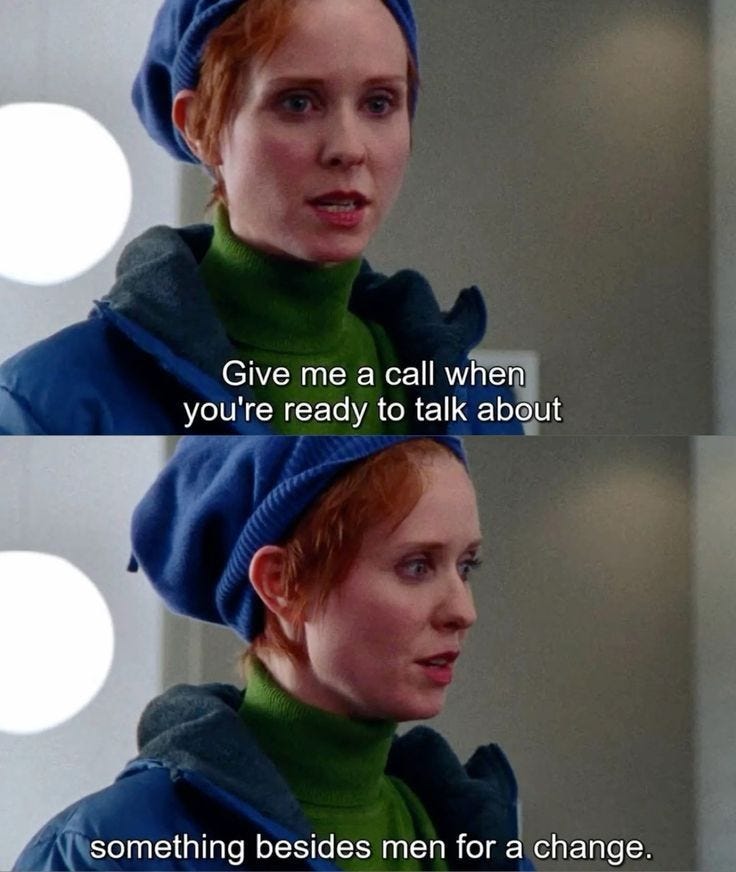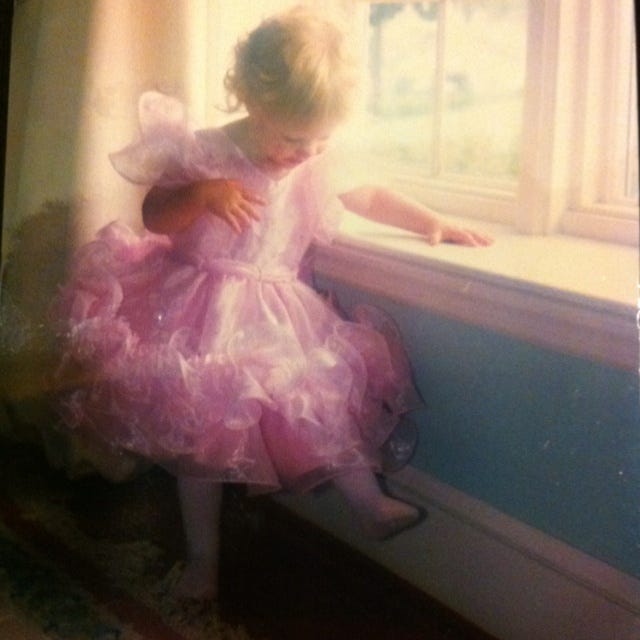all we ever talk about is men.
how the patriarchy shaped our friendships, our feminism, and our conversations.
“How does it happen that four such smart women have nothing to talk about but their boyfriends? What about us? What we think, we feel, we know? Does it always have to be them?” (Sex and The City, Season 2, Episode 1)
Miranda’s question lingers – not just over brunch in Manhattan, but in nearly every corner of female friendship. We like to believe we’ve outgrown it, that women today are independent and self-fulfilled. But if we are really as autonomous as we claim to be, why can’t we talk about anything else? Why do our conversations so often orbit men rather than each other?
This isn’t inherently our fault – we’ve been conditioned to this. Society has taught us to adhere to the patriarchy not just romantically, but even in our most sacred spaces: our friendships.
Growing up, I watched every Disney Princess movie as it came out. I dressed up as every princess who resonated with me or who I saw myself in. Yet every heroine’s arc is defined by love, their ‘happy ever after’ involves marrying the perfect man. It took until 2012 to get a Disney Princess movie where the heroine doesn’t get married (Brave). Yet, the whole film is built on the idea of finding her a husband, and just because she wasn’t inherently ‘girly’ she didn’t get one. What does that teach girls? That you’re either the sweet, soft, feminine type who marries, or the bold, rebellious one who doesn’t get chosen? Even female-led films aren’t built on empowering women. Take Mean Girls – one of the most successful films in the 2010s – which is purely centred around rivalry and competing with other women for a man. The Bechdel Test was never meant to be revolutionary, but the fact that so many beloved films still fail it speaks volumes. If the stories we grew up with celebrate pettiness and male validation, how else were we supposed to learn to talk to each other?
The architecture of female friendship is usually widely celebrated – everyone loves the idea of platonic soulmates and your best friends providing the strongest sisterhood around, so why do these friendships seem to ‘pause’ during romantic relationships and resume after breakups? We’re so quick to prioritise men over the women who have spent years caring for us. Even when these relationships end, and the friendships rekindle it’s usually a form of emotional aftercare – a debrief and a chance to vent – to validate your feelings. And these ‘catch ups’ over coffee are often just catching each other up on what he did so we can analyse every detail. It’s always a conversation about what we’re doing because we no longer live with our friends.
Even the idea of ‘girl’s nights’ are infiltrated by men. Even these moments meant to be about female connection get onto conversations like ‘post a good photo of me so he knows what he’s missing.’ We joke about going on ‘two-mans’ which just results in what was supposed to be dancing and having fun with your girlfriends into finding ways to hook up with men. Heteronormative dynamics still dictate the structure of our leisure and language – even in moments designed for escape.
However, this language is powerful. There is a unique bond that is formed by talking about men and sharing ‘lore’. Swapping stories of heartbreak is a cultural language, a rite of passage, a fast-track to a close female friendship. Some of my closest friendships started with gossips over cocktails about how our ex’s ruined our lives. By knowing you and a new friend have been treated similarly, it provides a kind of companionship, an instant friendship, that is hard to achieve any other way. Is it a true connection though – or trauma bonding in disguise? Are we forming friendships, or just comparing war wounds?
Even in social media, all we talk about is men when we should be talking about the bigger picture. This decade has seen the birth of the quintessential ‘feminist man’. That man who walks around with Sally Rooney books in his back pocket and claims period products should be free. He posts bell hooks and Joan Didion quotes on Instagram, goes to the abortion rights march, claims he’s never watched porn because it’s ‘exploitative’. He’s so perfect. He reads and he cares. But it’s a performance that still leaves women as the supporting act. If our real-life friendships are shaped around men, is it any wonder that even our feminism – online and offline – is starting to revolve around them too?
We all know it’s a performance as well. That man sitting in the café with his matcha has been reading the same page of Bell Jar for ten minutes now without turning the page. Yet we all fall for it, because we’re so starved of being understood that when a man says the right thing, we simply romanticise him for stating the obvious. If we’ve let men infiltrate our conversations with our closest friends, why are we letting them treat feminism as a performative way to enhance their attractiveness. He only becomes desirable because he does something as simple as respecting us. And once again, the male gaze wins – this time dressed in feminist theory and empathetic intellectuality.
If we’ve let men infiltrate our conversations with our closest friends, is it any surprise we’ve also let them infiltrate feminism itself? Have our lives been reduced to lifetimes of asking our friends, ‘What’s wrong with me? Why doesn’t he want me?’ while praising men who do the bare minimum and say ‘Yeah, their body their choice’?
So, where is the line between being there and supporting your girlfriends when they need to talk about men, and allowing your entire friendship to be built on them? We stood up for the right to vote, we demanded autonomy. Let’s not let that legacy be reduced to friendships centred on men – or a feminism repackaged through the male gaze.







i loooved this! as someone whos not dating men (thank god lol) i am so intrigued by the way the patriarchy is shaping and affecting all of us, me too. I think the very fact girls are brought up conditioned to believe that being in a relationship, being a wife and a mother, is an ultimate goal for them affects all us women, but as someone watching from the outside the way my straight friends center romantic relationships in a way i (want to) think i never have speaks volumes. thank you for sharing this!